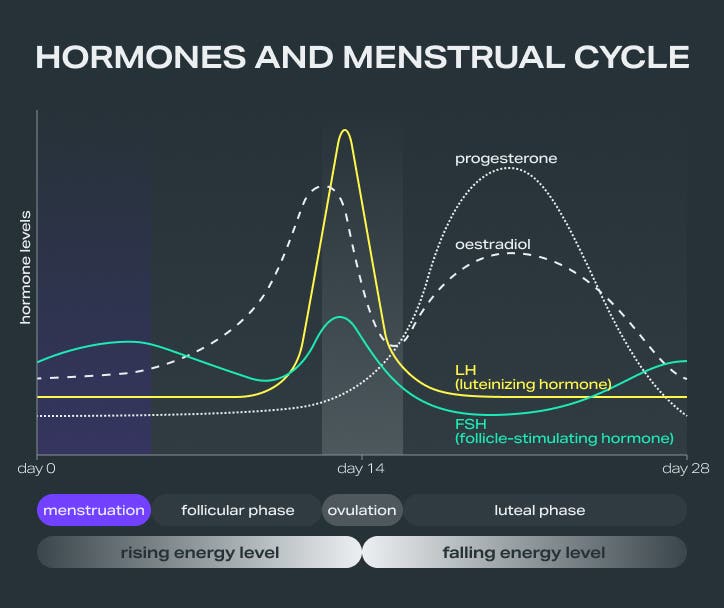There is a strong relationship between the female hormonal cycle and exercise - and yet not enough people know or talk about it. If you want to improve your performance and give your all, it’s important you understand your body’s state and needs at different stages of your cycle, because your cycle affects how you feel and train.
The good news: the Daily Athlete Score can help shed some light on how your body’s performance changes throughout your cycle. If you’re feeling particularly energetic and up for your workouts, you might be in the phase just before ovulation. Feeling tired, sluggish, and just not that motivated? Chances are your progesterone levels are rising. So when you look at the whole picture, it’s no wonder your DAS may fluctuate over the month. But not to worry - the purpose of the DAS is not to aim for a score of 100 every day.
The DAS is a snapshot of your overall fitness level based on five components: consistency, strength, stamina, skill, and speed. The menstrual cycle can have a significant effect on muscle performance, specifically strength and power output, as well as other aspects that contribute to your DAS score. To better understand and use your DAS, here are some ways your cycle may affect your score:
Stamina: During menstruation and your luteal phase, you may experience fatigue and drops in energy levels and endurance, which will affect your stamina and aerobic capacity. Your motivation to work out can reach its peak in the ovulation phase (between week two and three of your cycle), while the opposite can be true for your luteal phase.
Strength: Your cycle can also cause changes in muscle soreness, recovery time, and strength, which can affect your overall strength and power output. While every person who menstruates is slightly different, peak power can often increase in the ovulation phase.
Speed: Increased body temperature during the luteal phase of your menstrual cycle can improve your performance in short-duration activities requiring speed and power via better muscle activation and increased blood flow. However, you may also experience changes in reaction time, coordination, and agility, which can affect your overall speed and even power output (aka your strength score).
Skill: If that wasn’t already enough to deal with, your luteal phase may also affect your cognitive and motor skills, such as reaction time, coordination, and accuracy. These skills are important for performing exercises with proper form, so even if it can negatively impact your DAS, don’t worry too much if you feel your technique slipping on a few days - it’s totally normal.
Overall, your menstrual cycle will affect your body in a variety of ways, many of which also affect the metrics contributing to your score, even your consistency - especially if you struggle with painful cramps and even more so if you suffer from endometriosis. It's important to be aware of these potential effects, listen to your body, and adjust your training intensity accordingly (the adapt session feature for Coach days can help you here) or try some stretching sessions in the app. Don’t let your DAS hold you back from prioritizing rest and stretching. Remember: your DAS is there to help you use data to understand your body output better, it’s not a PB to push you constantly.

It can be fascinating to understand how your individual cycle affects certain or all performance aspects compared to someone else, but don’t let comparison be the thief of joy. Focus on your body, your journey, and your enjoyment of the process. Over time, noticing anomalies in your regular body response can be useful, but don’t let the DAS bring you down. The only score that should be prioritized above all else is your consistency, because at the end of the day, consistency is key. Work with your cycle to learn what feels good and stick to it. On days where you’re not up to a Coach session, prioritize some lower intensity movement to really keep up your consistency and build a lifelong fitness habit. After all, it’s a marathon, not a sprint, and every step counts.